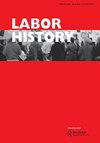Vietnamese indentured labourers: The intervention of the French colonial government in regulating the flow of Vietnamese labourers to the Pacific Islands in the early twentieth century
IF 0.7
4区 管理学
Q1 HISTORY
引用次数: 0
Abstract
ABSTRACT This study focuses on the penetration of sovereign power in regulating Vietnamese labour migration to the French colonies and Establishments in the Pacific Islands in the late 19th to mid-20th centuries. It argues that the French colonial authorities in Vietnam played an overt and directly intervening role in the labour migration system in their colonies, in contrast to the British approach, which was much more hands-off. First, this paper shows the interaction between the French colonial states to solve the labour shortage problem in the Pacific Islands under Metropolitan France’s regulations. Then, it provides a detailed account of how the French colonial government exercised its power over the inhabitants by organising, monitoring, and transforming Vietnamese migrants into docile subjects even when they were in other French colonies. Finally, this study points to some legacies of the colonial government’s migration policy for Vietnamese migrants in decolonisation. From there, it provides new insights into studying the relationship of the colonial state with migrant workers and adds more knowledge about Vietnamese indentured labourers under the domination of French colonialism.越南契约劳工:二十世纪初法国殖民政府对越南劳工流向太平洋岛屿的干预
摘要:本研究聚焦于19世纪末至20世纪中期,主权权力在调节越南劳工向法国殖民地和太平洋岛屿机构迁移过程中的渗透。它认为,法国在越南的殖民当局在其殖民地的劳工移民系统中扮演了公开和直接的干预角色,与英国的做法形成鲜明对比,后者更加不干涉。首先,本文展示了法国殖民国家在法国大都会的管制下解决太平洋岛屿劳动力短缺问题的互动。然后,它详细描述了法国殖民政府如何通过组织、监控和将越南移民转变为温顺的臣民来行使其对居民的权力,即使他们在其他法国殖民地。最后,本研究指出了殖民政府在非殖民化过程中对越南移民的移民政策的一些遗留问题。由此,它为研究殖民国家与移民工人的关系提供了新的见解,并增加了对法国殖民主义统治下越南契约劳工的更多了解。
本文章由计算机程序翻译,如有差异,请以英文原文为准。
求助全文
约1分钟内获得全文
求助全文
来源期刊

Labor History
Multiple-
CiteScore
1.00
自引率
28.60%
发文量
44
期刊介绍:
Labor History is the pre-eminent journal for historical scholarship on labor. It is thoroughly ecumenical in its approach and showcases the work of labor historians, industrial relations scholars, labor economists, political scientists, sociologists, social movement theorists, business scholars and all others who write about labor issues. Labor History is also committed to geographical and chronological breadth. It publishes work on labor in the US and all other areas of the world. It is concerned with questions of labor in every time period, from the eighteenth century to contemporary events. Labor History provides a forum for all labor scholars, thus helping to bind together a large but fragmented area of study. By embracing all disciplines, time frames and locales, Labor History is the flagship journal of the entire field. All research articles published in the journal have undergone rigorous peer review, based on initial editor screening and refereeing by at least two anonymous referees.
 求助内容:
求助内容: 应助结果提醒方式:
应助结果提醒方式:


